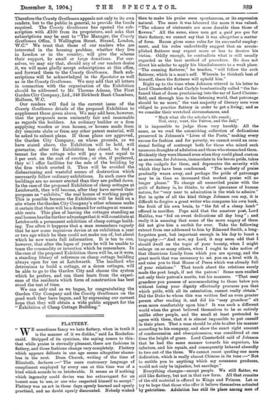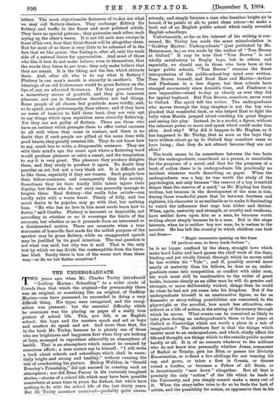" W E sometimes fancy we hate flattery, when in truth
it is the manner of it we dislike," said La Rochefou- cauld. Stripped of its cynicism, the saying comes to this : that while praise is eternally pleasant, there are fashions in flattery, and those fashions change very completely. Flattery which appears delicate in one age seems altogether shame- less in the next. Dean Church, writing of the time of Elizabeth, declares :—" The mere customary language of compliment employed by every one at this time was of a kind which sounds to us intolerable. It seems as if nothing which ingenuity could devise was too extravagant for an honest man to use, or one who respected himself to accept." Flattery was an art in those days openly learned and openly practised, and no doubt openly discounted. Nobody wished then to make his praise seem spontaneous, or its expression natural. The more it was laboured the more it was valued. "The odours of ointments are more durable than those of flowers." All the same, since men got a quid pro quo for their flattery, we cannot say that it was altogether a matter of form. Bacon gives some rules for its successful employ- ment, and his rules undoubtedly suggest that an accom- plished flatterer may expect more or less to deceive his victim. Oddly enough, he contradicts what is still usually regarded as the beat method of procedure. He does not direct his scholar to apply his blandishments to a weak place. "The cunning flatterer," he teaches, "will follow the arch flatterer, which is a man's self. Wherein he thinketh best of himself, there the flatterer will uphold him."
Right up to the time when Johnson uttered in his letter to Lord Chesterfield what Carlyle bombastically called "the far- famed blast of doom proclaiming into the ear of Lord Chester- field, and through him to the listening world, that patronage should be no more," the vast majority of literary men were obliged to practise flattery in order to get a living; and as we consider their wretched circumstances, and
"Mark what ills the scholar's life assail; Toil, envy, want, the Patron, and the Jail,"
it is impossible to judge them very harshly. All the same, as we read the astonishing collection of dedications preserved in Johnson's "Lives of the Poets," making every excuse for fashion and for poverty, we cannot avoid an occa- sional feeling of contempt both for those who mixed such nauseous draughts of adulation and those who stomached them. Evidently they were blamed even when they could plead custom as an excuse, for Johnson, immaculate in his heroic pride, takes up the cudgels for them, and deprecates the severity with which they have been condemned. "The modesty of praise gradually wears away, and perhaps the pride of patronage may be in time so increased that modest praise will no longer please." To charge all unmerited praise with the guilt of flattery is, he thinks, to show ignorance of human nature, for "very near to admiration is the wish to admire." But in spite of all the kind things Johnson can say, it is difficult to forgive a great writer who compares his own book, the fruit of his own brain, to "the fat of a cheap lamb" offered in sacrifice. Pope said that the amateur poet, Lord Halifax, was "fed on sweet dedications all day long " ; and really it is amazing that some of the more sugary of them did not give him a surfeit for ever. Take the following extract from one addressed to him by Edmund Smith, a long. forgotten poet, but important enough in his day to boast a biography :—" And now, my Lord, it may seem odd that I should dwell on the topic of your bounty, when I might enlarge on so many others, when I ought to take notice of that illustrious family from which you are sprung, and the great merit that was necessary to set you on a level with it, and raise you to that House of Peers which was already full of your relations." That touch about the relations surely made the poet laugh, if not the patron Some men exalted not only their patron's merits, but his manners. "That easy grandeur you possess of accommodating to those below you without losing your dignity effectually procures you that which pride, with all its ostentation, cannot really obtain." Did the Duke to whom this was written feel an even greater person after reading it, and did his "easy grandeur" sit even more comfortably upon him ? It was such a different world when the great believed themselves to be so entirely wnlike other people, and the small at least pretended to agree with them, that it is almost impossible to put oneself in their place. That a man should be able to alter his manner according to his company, and show the exact right amount of condescension and obsequiousness, was considered at one time the height of grace. Lord Chesterfield said of Johnson that he had the same manner towards his superiors, his inferiors, and his equals, and consequently behaved absurdly to two out of the three. We cannot resist quoting one more dedication, which is really almost Chinese in its tone :—" Not to entitle you to anything which my meanness produces, would not only be injustice, but sacrilege."
Everything changes—except people. We still flatter, we still like flattery, but not in that raw form. All that remains of the old material is offered to Kings and Princes. Let us try to hope that those who offer it believe themselves actuated by patriotism. Adulation has still its place among men of letters. The most objectionable flatterers of to-day are what we may call flattery-dealers. They exchange flattery for flattery, and traffic in the finest and most polished article. They have no special patrons; they patronise each other, each crying up the other's wares. It is not till each man sweeps in front of his own door that Grub Street will be altogether clean. But for most of us there is very little to be ashamed of in the fact that we like praise. Our feeling is, after all, only the weak side of a natural desire for appreciation. And most of those who like it best do not make believe, even to themselves, that the words they listen to are true ; they only make believe that they are meant. It is the liking, not the lies, which attracts them. And, after all, who is to say what is flattery ? Flattery in one man's mouth is sincerity in another's. The blessings of an old Irishwoman would be gross flattery on the lips of, say, an educated Scotsman. Yet they proceed from a momentary access of goodwill, and they give innocent pleasure, and are in themselves therefore not bad things. Some people of all classes feel gratitude more vividly, and, so to speak, more picturesquely, than others; and if they have no sense of humour to hold them back, they are very apt to say things which upon repetition seem absurdly flattering. Yet they are not guilty of flattery. There are those who have an instinct which prompts them to offer verbal caresses to all with whom they come in contact, and there is no doubt that if such people are gifted at the same time with good hearts, they greatly sweeten life. They do not know how to say, much less to write, a disagreeable sentence. They see with their mind's eye the exact spot where a flattering word would produce pleasure or salve a smart, and the temptation to say it is very great. The pleasure they produce delights them, and they study to produce it again. No doubt they practise an art, but not a very black art. It is difficult not to like them, especially if they are women. Such people love their fellow-creatures, and consequently they like society. Sometimes they let their kindly little talent injure their dignity, but those who do not envy can generally manage to forgive them. Real flattery—the really false article—can hardly exist with a warm heart. Plenty of folly, and too much desire to be popular, may go with that, but nothing base. "He who has no love in him must needs learn how to flatter," said Goethe. Flattery is innocent or despicable, not according to whether or no it oversteps the limits of the accurate, but whether or no it proceeds from an interested or a disinterested motive. There are moments when a true statement of honorific fact made for the selfish purpose of the• speaker may be gross flattery, while an exaggerated speech may be justified by its good intention. The real question is not what was said, but why was it said. That is the only test by which we can divide the contemptible from the harm- less kind. Surely there is less of the worse sort than there was,—or do we but flatter ourselves ?
THE UNDERGRADUATE.







































































 Previous page
Previous page